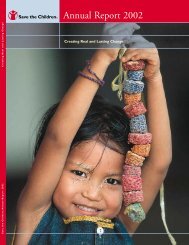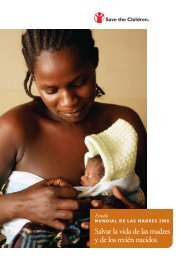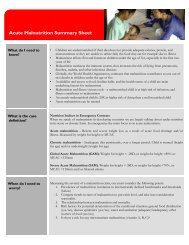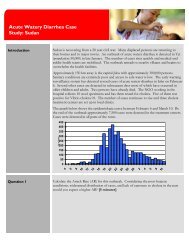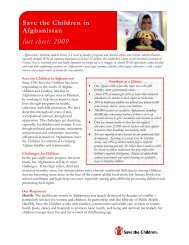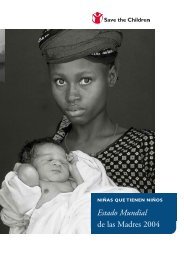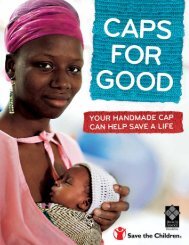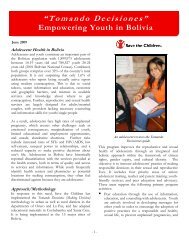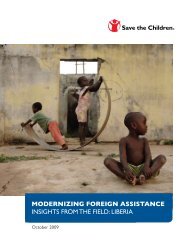The Power and Promise of Girls' Education - Save the Children
The Power and Promise of Girls' Education - Save the Children
The Power and Promise of Girls' Education - Save the Children
Create successful ePaper yourself
Turn your PDF publications into a flip-book with our unique Google optimized e-Paper software.
• Ghana was doing well with regard to girls’ education<br />
in 1990, <strong>and</strong> did not have far to progress compared<br />
to o<strong>the</strong>r developing countries. However, it has seen a<br />
drop in primary school entrants reaching grade five.<br />
A possible contributing factor is <strong>the</strong> large number <strong>of</strong><br />
refugees in Ghana from Côte d’Ivoire <strong>and</strong> Liberia.<br />
• Burundi has a large number <strong>of</strong> internally displaced<br />
persons in <strong>the</strong> western part <strong>of</strong> <strong>the</strong> country. It has also<br />
experienced brutal conflict among Tutsis, Hutus <strong>and</strong><br />
o<strong>the</strong>r groups. Burundi has a large number <strong>of</strong> children<br />
orphaned by AIDS <strong>and</strong> rapid population growth.<br />
a severe effect on Lesotho’s educational system.<br />
Between 1990 <strong>and</strong> 2000, <strong>the</strong> number <strong>of</strong> primary<br />
school children entering fifth grade has dropped by<br />
15 percent, <strong>and</strong> girls’ gross primary enrollment ratio<br />
has increased to 125, indicating that girls are not<br />
entering school on time or progressing at a normal<br />
rate. Teachers are being lost to sickness <strong>and</strong> death, <strong>and</strong><br />
children are being orphaned at an alarming rate – with<br />
12 percent <strong>of</strong> <strong>the</strong> country’s children having lost one or<br />
both parents to AIDS. 47 <strong>Children</strong> orphaned by AIDS in<br />
Lesotho are 15 percent less likely to attend school<br />
than <strong>the</strong>ir counterparts who have not lost parents to<br />
<strong>the</strong> disease. 48<br />
• Djibouti experienced an uprising by <strong>the</strong> Afars minority<br />
in <strong>the</strong> 1990s. <strong>The</strong> 10-year uprising ended with <strong>the</strong><br />
signing <strong>of</strong> a peace accord in 2001. However,<br />
educational services continue to be strained by rapid<br />
population growth <strong>and</strong> <strong>the</strong> presence <strong>of</strong> more than<br />
25,000 refugees from neighboring Somalia.<br />
• In Congo, <strong>the</strong> combination <strong>of</strong> a high death toll due<br />
to AIDS, ethnic unrest in <strong>the</strong> late 1990s <strong>and</strong> rapid<br />
population growth have resulted in a dramatic drop<br />
in school enrollment.<br />
• Eritrea was engaged in a border war with Ethiopia<br />
<strong>and</strong> has <strong>the</strong> fifth highest population growth rate in<br />
<strong>the</strong> world.<br />
• In Iraq, years <strong>of</strong> conflict <strong>and</strong> international sanctions<br />
have resulted in fewer children reaching fifth grade<br />
<strong>and</strong> a drop in <strong>the</strong> ratio <strong>of</strong> girls to boys attending<br />
primary school.<br />
• Civil war in Rw<strong>and</strong>a began in 1990. In 1994, more than<br />
800,000 Tutsis <strong>and</strong> moderate Hutus were killed.<br />
Following <strong>the</strong> genocide, 2 million refugees fled <strong>the</strong><br />
country, though most have now returned. Rw<strong>and</strong>a also<br />
has one <strong>of</strong> <strong>the</strong> world’s highest percentages <strong>of</strong> children<br />
orphaned by AIDS.<br />
• In Sudan, internal conflict since <strong>the</strong> 1980s has resulted<br />
in 4 million internally displaced persons. Rapid<br />
population growth combined with numerous refugees<br />
from Chad, Eritrea <strong>and</strong> Ug<strong>and</strong>a has led to declining<br />
progress in education.<br />
• Papua New Guinea experienced a nine-year<br />
secessionist revolt which claimed over 20,000 lives<br />
before ending in 1997. Rapid population growth has<br />
also contributed to <strong>the</strong> country’s inability to make<br />
progress in education.<br />
20<br />
THE POWER AND PROMISE OF GIRLS’ EDUCATION



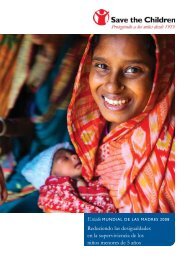
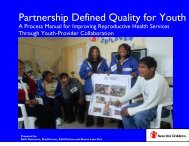
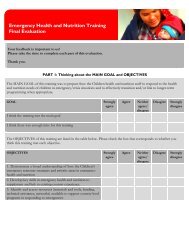
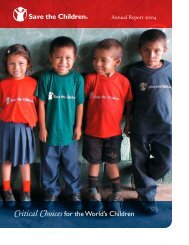
![View full document [PDF 3.39 MB] - PreventionWeb](https://img.yumpu.com/27308954/1/190x245/view-full-document-pdf-339-mb-preventionweb.jpg?quality=85)
